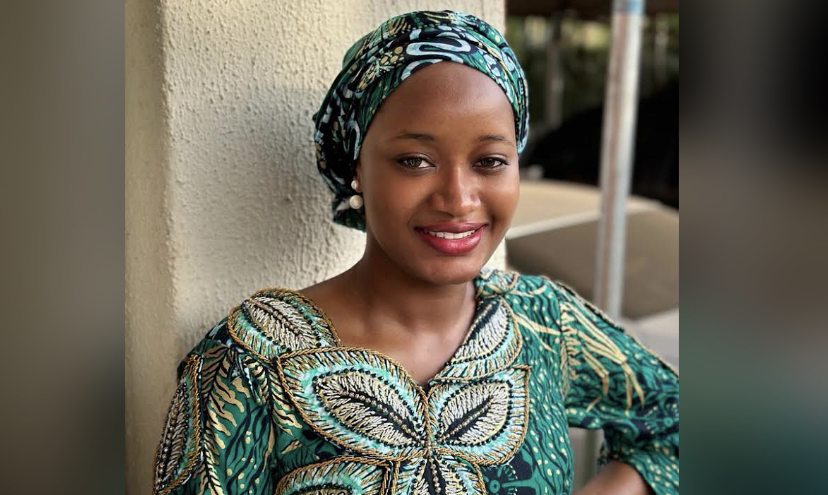Understanding Hauwa Yusuf Kazaure’s books on punctuations, climate change and the prophets

The writing of a book is a very serious business that needs a high degree of focus, commitment and determination. However, with the advent of social media, these attributes are scarcely found, particularly among youths.
Yet, for good or bad reasons, social media, a thing which both the old and young are part of, has come to stay with us, regardless of the fact that it continues to distract especially the youth from serious tasks.
Nigerian youth and teenagers, especially in the North, remain connected to social media platforms. They derive pleasure from Facebooking, twitting and tik-toking for hours without end, and in most cases, wasting valuable time that could, alternatively, be used for productive ventures.
Thankfully, Hauwa Yusuf Kazaure chose to take the path less travelled by her peers. She devotes her time to acquiring knowledge and using the same to educate the kids, her peers and others in society.
She, encouragingly, uses her time for the purpose of educating herself and others at a time when her peers partake in social media for unhelpful and negative purposes.
Little or no wonder, Hauwa Yusuf Kazaure has been able to write some very interesting books namely “Office of Kids on Climate Change,” “The Prophets” and the “Punctuations,” among other publications to her credit.
The books, written in simple English tenses and demonstrated with relevant marks, are no doubt remarkably outstanding.
“Office of Kids on Climate Change”
Regardless of any issue at hand, kids are what they are – kids. Yet, because of the importance of some issues to the world or community we live in, seemingly difficult issues that are, traditionally, regarded as adult issues must be brought to the level of understanding of kids.

That is what Hauwa Yusuf Kazaure’s book, titled, “Office of Kids On climate change,” has successfully done.
The book breaks the difficult issue of climate change to the basic level where it is easily understood by kids. It raises issues like: What is the meaning of global warming? What are the causes of global warming and its consequences? And, finally, what are the possible solutions?
The book, in simple grammar and precise form, explains that climate change refers to the long-term changes in global temperatures and other characteristics of the atmosphere.
It explains in a language and manner easily comprehended by kids that climate has changed throughout earth’s long history, but this time it’s different. It points out that human activity is causing worldwide temperatures to rise higher and faster than any time we know of in the past.
It explains to the kids that the earth is warming up at a steady pace. The reason for this is the increase in human-caused greenhouse gases, which has led to health, ecological and humanitarian crises.
Scientists estimate that since the Industrial Revolution, human activity has caused the earth to warm by approximately 1°C. While that might not sound like much, it means big things for people and wildlife around the globe.
Unfortunately, rising temperatures, kids should understand, do not just mean that we will get nicer weather – if only! The changing climate will actually make our weather more extreme and unpredictable.
As temperatures rise, some areas will get wetter and lots of animals (and humans!) could discover that they are not able to adapt to their changing climate. Despite this, the book shows that hope is all not lost as the fight against climate change is a real opportunity presented to humankind to transition to a low-carbon society, creating jobs, innovation and social justice locally and internationally.
This book is recommended to all lovers of a safe environment. It is my strong view that the book, packed full of fun features, jaw-dropping facts and awe-inspiring photos, will keep youngsters educated and entertained without end!
“The Prophets of Islam”
In the book titled “The Prophets of Islam,” the young author says that for the religion of Islam and its adherents, a prophet is a messenger, a person through whom the almighty Allah in His infinite mercy speaks. She says that without the prophets, life and, indeed, the world could not be interpreted and or understood.

For the religion of Islam and its adherents, a prophet is a messenger, a person through whom Allah speaks.
The book goes on to define prophets as “chosen people that were sent by God to humans in different times and places to communicate his (sic) message,” and identifies some of them namely Adam (AS), Nuh (AS), Hud (AS), Ibrahim (AS), Ismail (AS), Yaqub (AS), Yusuf (AS), Ayyub (AS), Musa (AS), Dawud (AS), Sulaiman (AS), Yunus (AS), Isah (AS) and, lastly, Muhammad (SAW).
Although not delving into the contents of other religions, the book makes it clear that in Islam prophethood has a special status and significance.
From the scanty stories narrated by the Prophets mentioned in the book, it can be understood that according to Islam, God created man for a noble purpose: to worship Him and lead a virtuous life based on His teachings and guidance.
How would man know his role and the purpose of his existence without receiving clear and practical instructions on what God wants him to do? Here comes the need for prophethood, the essence of which this book tries to highlight.
The book, briefly, highlights the fact that the almighty Allah has chosen from every nation, at least, one prophet to convey His Message to people.
To the credit of the author, the book shows how the prophets were chosen and who were entitled to this great honour and concludes by saying that prophethood is God’s blessing and favour that He bestowed on whom He wills.
In the book, from a casual survey of the prophets, some features of a prophet become recognisable. They are: he is the best in his community, morally and intellectually. This is necessary because a prophet’s life serves as a role model for his followers. His personality should attract people to accept his message rather than drive them away by his imperfect character.
After receiving the message, he is infallible. That is, he would not commit any sin. He might make some minor mistakes, which are usually corrected by revelation.
He is supported by miracles to prove that he is not an imposter. Those miracles are granted by the power and permission of the almighty Allah and are usually in the field in which his people excel and are recognised as superior.
Interestingly, the book was illustrated by stating the major miracles of the three prophets of the major world religions, Judaism, Christianity and Islam, Musa (AS), Isa (AS) and Muhammad (SAW), respectively.
Moses’ contemporaries were excellent in magic, and so, his major miracle was to defeat the best magicians of Egypt of his day.
Jesus’ contemporaries were recognised as skilled physicians, therefore, his miracles were to raise the dead and cure incurable diseases.
The Arabs, the contemporaries of Prophet Muhammad (SAW), may the mercy and blessings of Allah be upon him, were known for their eloquence and magnificent poetry. So, Prophet Muhammad’s major miracle was the Qur’an, the equivalent of which the whole legion of Arab poets and orators could not produce.
The book, specifically, shows that every prophet states clearly that what he had received is not of his own making, but from the almighty Allah, for the well-being of mankind. He also confirms what was revealed before him and what may be revealed after him.
So, the message in the book, in essence, is to tell Muslims and those who care to read it, the significance of prophethood in Islam and the almighty Allah’s revelations to His messengers.
The book shows that prophets are necessary for conveying Allah’s instructions and guidance to mankind. Otherwise, as human beings, we will not know why we were created. What will happen to us after death? Is there any life after death? Are we accountable for our actions?
Thankfully, these and so many other questions, though briefly, have been answered in this book. The answers are authentic and lucidly brought to readers by the young author. That is why everybody is encouraged to read the book.
“Punctuations”
Hauwa Yusuf Kazaure’s book, titled, Punctuations (With Fun and Illustrations) can simply be described as an essential book for English beginners.
Written in simple English tenses and demonstrated with relevant punctuation marks, the book, from its outlook is, no doubt, an excellent gift for kids.
However, in reality, adults who are already fairly acquainted with the English language can find the book relevant mainly because an interesting and, perhaps, unanticipated result of the development of the English language in society calls for an increased need for good writing skills.
Blogs, electronic newsletters and other “new media” of which most users of the English language are now part of, require both useful content and good writing to educate, attract and keep readers.
Thankfully, the book has mentioned key elements of good writing that, it says, are simple. These include grammar, spelling, punctuation and capitalisation.
According to the author, and she is right, mastering the rules and conventions in the English language make writing easier to understand and more enjoyable to readers, and the reasons are simple.
The author shows how grammar explains the forms and structure of words (called morphology) and how they are arranged in sentences (called syntax). In other words, grammar provides the rules for the common use of spoken and written language so we can more easily understand each other.
Reading the book, somebody will understand that the building blocks of grammar are the eight parts of speech: Verbs express actions, events, or states of being; Nouns name a person, animal, place, thing, or abstract idea; Pronouns take the place of nouns or another pronoun; Adjectives modify nouns or pronouns by describing, identifying or quantifying them. An adjective usually precedes the noun or the pronoun that it modifies.
Adverbs modify a verb, adjective, another adverb, a phrase, or a clause and indicate manner, time, place, cause or degree. Adverbs can be recognised because they answer the question of how, when, where or how much. Adverbs often end in ly.
Prepositions link nouns, pronouns, and phrases to other words in a sentence and usually indicate a relationship of time, space, or logic; Conjunctions link words, phrases, and clauses while Interjections are added to a sentence to convey emotion, and are usually followed by an exclamation point.
It becomes also clear in the book that every complete sentence has two parts: a subject (who or what the sentence is about) and a predicate (what the subject is doing). The subject is a noun or a pronoun; the predicate is a verb. The book helps readers to identify the subject of a sentence in order to find the verb and ask who or what. The answer is the subject.
Of course, the author understands that when to use punctuation and which type to use, can be confusing. To address that problem, the book looks briefly at each example and then expands with more details and examples of the punctuation type’s use.
It shows (with fun illustrations) what each punctuation mark looks like and explains its purpose in a sentence.
A comma has two purposes; it can break up a sentence with a short pause between phrases and clauses, or be used to separate items in a list.
A question mark ends a sentence that is a question.
An exclamation mark is a way of showing that the sentence has drama, for example, surprise, anger, or annoyance.
Colon has two uses. It is used to introduce a list, quotation or, sometimes, speech. Here, it suggests the speech is more important than usual. Or it can be used to show that the second clause in a sentence follows, or explains, the first.
A semi-colon can be used in two ways. It separates items in a list, where each item is made up of several words. More complicatedly, it works to show a pause in a sentence which is greater than a comma, but less than a full stop. This will be where there are two clauses of equal importance next to each other.
In essence, this book, Punctuations, considering its size, in my view, it should be kept in every handbag and because of its significance to understanding and speaking the English language, it becomes a necessary read for speakers of the language and those aspiring to do so.
In conclusion, as a youngster of the internet era, Hauwa Yusuf Kazaure should ensure that kids and her peers easily access her very educating books on social media platforms. That way, she will succeed in spreading knowledge and redefining the significance of reading for kids and youth.
Abdullahi M. Gulloma is an Abuja-based journalist, author and media entrepreneur
We have recently deactivated our website's comment provider in favour of other channels of distribution and commentary. We encourage you to join the conversation on our stories via our Facebook, Twitter and other social media pages.
More from Peoples Gazette

Politics
Katsina youths pledge to deliver over 2 million votes to Atiku
“Katsina State is Atiku’s political base because it is his second home.”

World
Iraq rules out missile strike in explosion at military base
A statement by the Security Media Cell, a media outlet affiliated with the Iraqi Joint Operations Command, explained that the explosion was from an ammunition and missile depot.

Health
WHO Global Malaria Programme launches new operational strategy
Progress towards critical targets of the WHO Global technical strategy for malaria 2016-2030 has stalled, particularly in countries with a high burden of the disease

Rights
U.S. spent $15 million, trained 46,000 on dispute resolution in Northern Nigeria: Embassy
The CIPP programme has helped mitigate violent conflict in at-risk communities and engaged women and youth in peace processes.

Anti-Corruption
Tinubu continued Nigeria’s massive corruption by appointing treasury looter Atiku Bagudu to cabinet: U.S. Govt
“We must ensure that all the other 15 aspirants must come together to ensure we win the November 16 election,” said the Ondo governor.

Rights
Lagos software engineer gets life imprisonment for raping 13-year-old girl
Mr Oshodi also held that the alibi and the issue of extortion, which the convict relied on, did not hold water.

States
Demographic Survey: NPC says 22 of 25 LGAs in Oyo covered
The National Population Commission says it has concluded the 2023/2024 Nigeria Demographic and Health Survey (NDHS) in 22 of 25 LGAs in Oyo.








